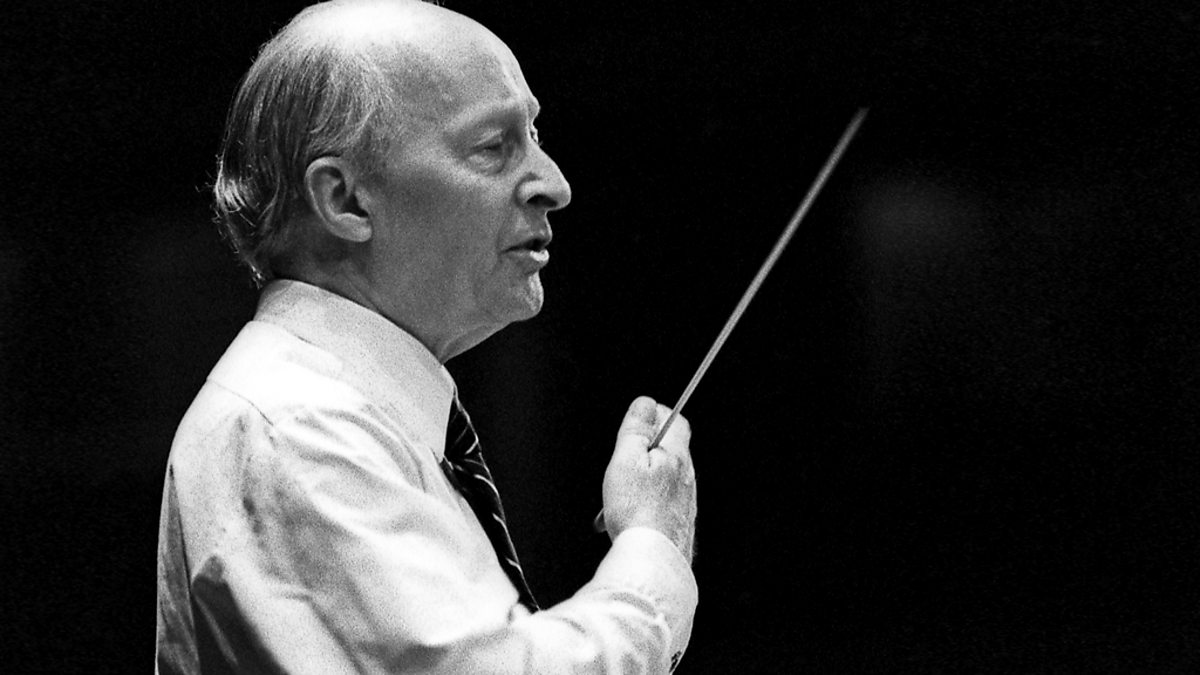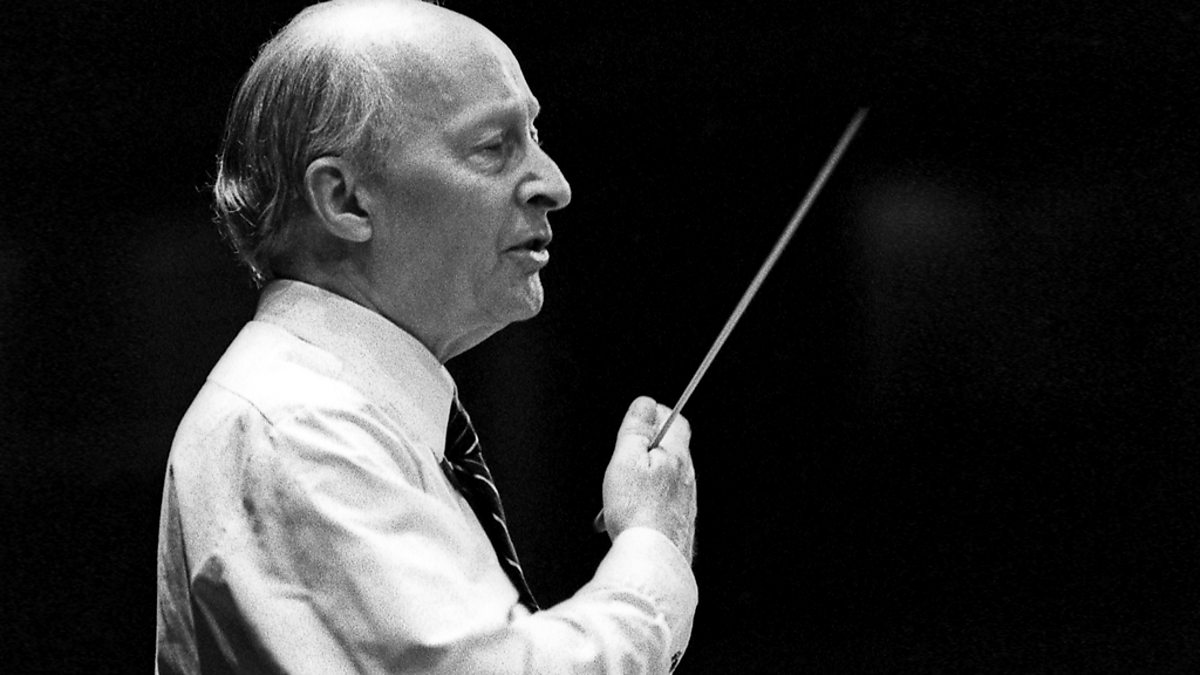Witold Lutosławski (1913 - 94); 22-26/1/18
Collapse
X
-
 Richard Tarleton
Richard Tarleton
Didn't you know/meet/study with/have dealings with the great man, ferney? I seem to remember you mentioning something. I attended the first performance of the Cello Concerto by Rostropovich - in fact a try-out in Exeter before the official first performance, with the Bournemouth SO cond. Edward Downes - this dapper man in a light blue suit bounded onto the stage to receive the applause.
-
I attended classes, workshops, and rehearsals with Lutoslawski - principally at the Britten-Pears School Study Weekend, in 1980, and then at Musica Nova in Glasgow the next year (both times when I was a student). I also attended public discussions prior to concerts in London in the '80s (when I wasn't). He was very generous with his time for me and everyone who wanted to ask him questions about his Music - and watching his painstaking and patient rehearsals was an education all of its own.[FONT=Comic Sans MS][I][B]Numquam Satis![/B][/I][/FONT]
Comment
-
-
Generally a good week of programmes so far - and it was astonishing to hear Lutoslawski's "Number One in the Charts" song at the start of Wednesday morning's broadcast! (I'd read mention of such songs in the Bodman Rae biography, but had no idea that they sounded so ... Family Favourites! It's like discovering that Ferneyhough wrote Mouldy Old Dough. )
)
BUT - what happened to the decade from Musique Funebre (1958) at the end of Tuesday's programme, to the Livre pour Orchestre (1968) that "properly" began Wednesday's??? Anyone would think that the composer wrote nothing in those years, when in fact it was the most formative period in his development - a description the composer himself frequently made clear. It was at this time that Lutoslawski heard Cage's Concert for Piano & Orchestra, firing his imagination to develop his own "collective ad libitum", and that he refined his non-serial twelve-note methods into the symmetrical chord masses - both of which create the characteristic "Lutoslawskian Sound" that dominates his Music. Nor were these developments purely Theoretical - they resulted in many of the composer's most important works such as the Jeux Venitiens, Trois Poemes d'Henri Michaux, Paroles Tissees - and two of his finest, the String Quartet, and the Second Symphony.
It is as if a programme has been dropped from the week - and the most important one at that!Last edited by ferneyhoughgeliebte; 25-01-18, 09:27.[FONT=Comic Sans MS][I][B]Numquam Satis![/B][/I][/FONT]
Comment
-
-
Ah, what the blazes - if you want a thing done ... and, to celebrate the composer's 105th Birthday today, here's the man himself conducting the Second Symphony:
... with all due apologies to the wittering twelve-year-old who opined that Lutos "wasn't the best conductor of his own Music" in Wednesday's programme. I think said witterer would be better advised (and happier in himself) sticking to playing with his Action Man.[FONT=Comic Sans MS][I][B]Numquam Satis![/B][/I][/FONT]
Comment
-
-
Originally posted by ferneyhoughgeliebte View PostAh, what the blazes - if you want a thing done ... and, to celebrate the composer's 105th Birthday today, here's the man himself conducting the Second Symphony:
https://www.youtube.com/watch?v=FstHCnc7fRE
Comment
-
-
Originally posted by Serial_Apologist View PostGlorious in every way, wasn't it? I've never heard this work played or sound better. -ish - I like the composer's slower, inexorable momentum at the start of the work. But Gardner's way worked splendidly, too.
-ish - I like the composer's slower, inexorable momentum at the start of the work. But Gardner's way worked splendidly, too.
I was much less enthusiastic about the Gardner/BBCSO Fourth Symphony played in today's programme, though: the first section didn't hold together as well as the composer's performances - it sounded bitty and fragmented, whereas the composer created a sense of "held breath" between the blocks of material, and the accumulation was more convincingly "Symphonic" as a result. On the other hand, Gardner rushed through the last two sections, rather - I so missed that pause before the final section begins; Lutos held it for as long as a breath can be held and the timing of the downbeat on the Harp was just perfect.[FONT=Comic Sans MS][I][B]Numquam Satis![/B][/I][/FONT]
Comment
-
-
Yes, almost all of them.... a new hi-res reference point for this oeuvre to set alongside various, sometimes more idiomatic, Polish editions (Wit/Naxos, Opera Omnia/Kaspszyk etc.)....Originally posted by Brassbandmaestro View PostAnyone been following Edward Gardner’s marvellous Chandos series?
The Chandos sound is pretty much a reference standard too. The album with Concerto for Orchestra and Symphony No.3 is one of the best in the series.
Comment
-
-
Other criticisms - for me general objections applying to COTW these days - are the lack of musical definition other than of the most superficial kind, such as the brief mention of serialism on Tuesday, (which btw was incorrectly attributed solely to the Musique Funèbre) - and lack of contextualisation in the musical world of Lutoslawsky's Poland: no mention of aesthetic and/or any poltical differences with contemporaries such as Baird, Kilar, Gorecki and Penderecki, or considerations of electronic music and particularly of Polish electronic composers such as Dobrowolsky, Kotonsky or (Bohuslaw) Schaeffer, and why perhaps Lutoslawsky did not take up this method of composing, notwithstanding the undoubted influence of its novel way of treating and combining orchestral sonorities, where Xenakis and perhaps Ligeti were influences on the whole New Polish school. I wonder if tomorrow's programme will take up the strong religious take on Polish musical tradition that became contemporaneous with Luto's effectual ignoring of it - what his views on his contemporaries in this respect, and theirs of him. I've heard it averred that many in Poland's musical world think of Lutoslawsky as the last of the country's great modernists.Originally posted by ferneyhoughgeliebte View PostBUT - what happened to the decade from Musique Funebre (1958) at the end of Tuesday's programme, to the Livre pour Orchestre (1968) that "properly" began Wednesday's??? Anyone would think that the composer wrote nothing in those years, when in fact it was the most formative period in his development - a description the composer himself frequently made clear. It was at this time that Lutoslawski heard Cage's Concert for Piano & Orchestra, firing his imagination to develop his own "collective ad libitum", and that he refined his non-serial twelve-note methods into the symmetrical chord masses - both of which create the characteristic "Lutoslawskian Sound" that dominates his Music. Nor were these developments purely Theoretical - they resulted in many of the composer's most important works such as the Jeux Venitiens, Trois Poemes d'Henri Michaux, Paroles Tissees - and two of his finest, the String Quartet, and the Second Symphony.
It is as if a programme has been dropped from the week - and the most important one at that!
Space could have been made for consideration of these aspects of this great composer - time saved by, for instance, omitting the performance of the Fourth Symph on tomorrow's programme - this being, for me, a disappointing piece that largely re-worked the Third, rather as Roussel's Fourth did his Third; and I can't help thinking there could have been some subconscious connection there, given Luto's admiration for Roussel 3.
Comment
-
-
A vedry interesting take on matters, especially the Roussel association (and I agree with you about each composer's Fourth Symphony having less substance than his Third Symphony). But I do take some issue with you about all of those subjects eithr ignored entirely or merely glossed over in these broadcasts, not beause I disagree with you in principle but because the slot simply allows far too little time for mention, let alone exploration, of such things - after all, the programme is meant mainly to include music!Originally posted by Serial_Apologist View PostOther criticisms - for me general objections applying to COTW these days - are the lack of musical definition other than of the most superficial kind, such as the brief mention of serialism on Tuesday, (which btw was incorrectly attributed solely to the Musique Funèbre) - and lack of contextualisation in the musical world of Lutoslawsky's Poland: no mention of aesthetic and/or any poltical differences with contemporaries such as Baird, Kilar, Gorecki and Penderecki, or considerations of electronic music and particularly of Polish electronic composers such as Dobrowolsky, Kotonsky or (Bohuslaw) Schaeffer, and why perhaps Lutoslawsky did not take up this method of composing, notwithstanding the undoubted influence of its novel way of treating and combining orchestral sonorities, where Xenakis and perhaps Ligeti were influences on the whole New Polish school. I wonder if tomorrow's programme will take up the strong religious take on Polish musical tradition that became contemporaneous with Luto's effectual ignoring of it - what his views on his contemporaries in this respect, and theirs of him. I've heard it averred that many in Poland's musical world think of Lutoslawsky as the last of the country's great modernists.
Space could have been made for consideration of these aspects of this great composer - time saved by, for instance, omitting the performance of the Fourth Symph on tomorrow's programme - this being, for me, a disappointing piece that largely re-worked the Third, rather as Roussel's Fourth did his Third; and I can't help thinking there could have been some subconscious connection there, given Luto's admiration for Roussel 3.
Comment
-
-
There are always places in these programmes where spaces open so wide one could drive a coach and horses through them - as for instance when on today's programme, mention made of Pope John Paul II's putative influence on the struggles that would lead to the ending of "communism" could have sparked an illuminating diversion completely germane to the directions taken by erstwhile avant-garde Polish composers thereafter, and considering Lutoslawsky's music in relationship with them. I suppose microscopic timings have to be calculated in the making of these programmes and the musical slottings therein, thus speedily foredooming any off-topicalising to never-never land.Originally posted by ahinton View PostA very interesting take on matters, especially the Roussel association (and I agree with you about each composer's Fourth Symphony having less substance than his Third Symphony). But I do take some issue with you about all of those subjects either ignored entirely or merely glossed over in these broadcasts, not because I disagree with you in principle but because the slot simply allows far too little time for mention, let alone exploration, of such things - after all, the programme is meant mainly to include music!
Comment
-




Comment